In a season where the New Jersey Devils are expected to see marked improvement in their performance and win-loss record, they’ll return to a Metropolitan Division that’s stacked with top-end teams and budding talent. For pandemic-era protocols, the 2021 season divided teams into temporary location-based divisions, but that all ends this season as the Metro, Atlantic, Pacific, and Central hubs will return as they were before 2020-21.
When divided into the traditional divisions, Metropolitan teams in 2021 combined for a 230-162-56 record — good for the second-best divisional winning percentage and first in points percentage. Needless to say, the Devils won’t have an easy path to a potential playoff bid in a division that harbors three of the top seven teams in the league from last season, amongst other high-quality teams and players. Let’s have a look at each of them.
Carolina Hurricanes (36-12-8)
The Hurricanes were one of the NHL’s very best teams last season, finishing second in points (80) before eventually losing in the second round of the postseason to the eventual Stanley Cup champion Tampa Bay Lightning. Boasting some top-end special teams in 2021, the Canes managed the second-best power play in the league and the third-best penalty kill. On top of that, they put together a stingy defense that gave up the fifth-fewest goals against in the league.
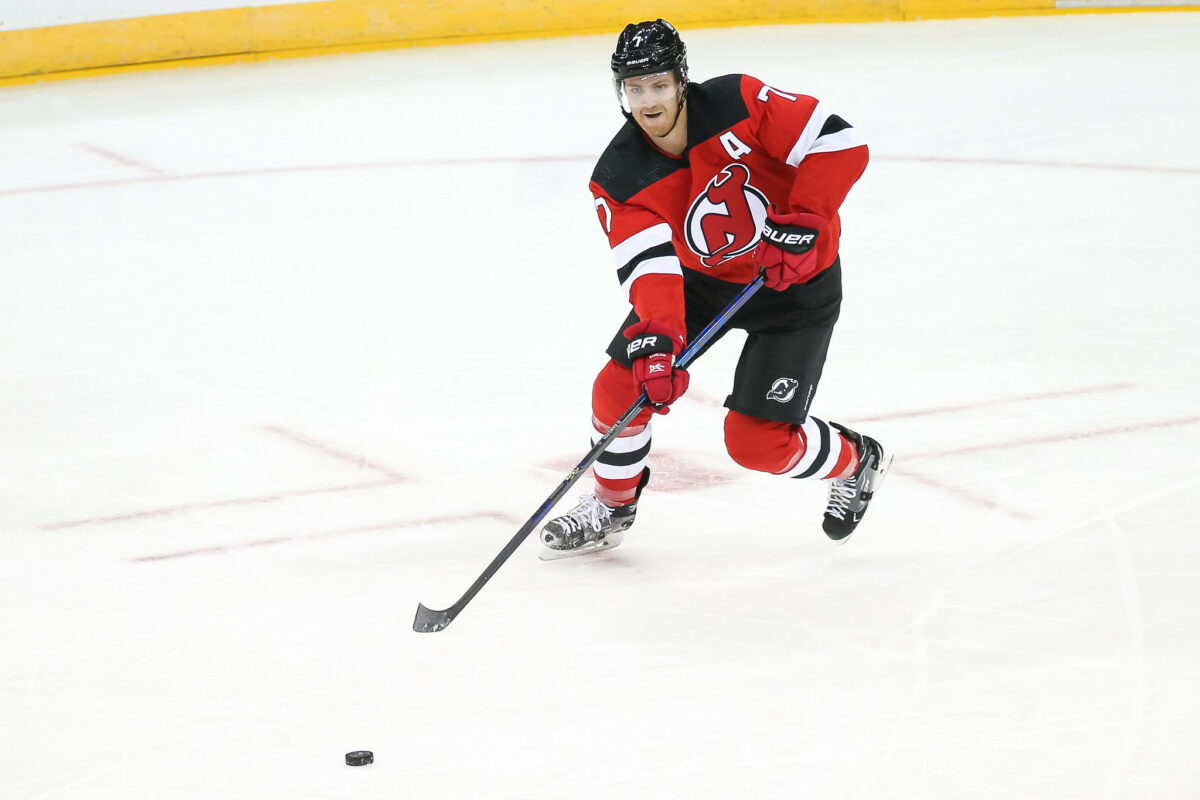
Those figures may seem like they make the Hurricanes the Devils’ Kryptonite considering New Jersey struggled mightily defensively while their special teams were equally miserable (28th power play, 31st penalty kill). However, Carolina’s questionable offseason resulted in losing two key components of their special teams and defense: defenseman Dougie Hamilton and goaltender Alex Nedeljkovic. Of course, Hamilton (Carolina’s best back-end point producer) ended up signing a huge contract in New Jersey. But Nedeljkovic was rather inexplicably dealt to the Detroit Red Wings after posting a fantastic .932 save percentage (SV%) and 1.90 goals against average (GAA), which garnered him enough Calder Trophy votes to place third.
Carolina would go on to sign former Toronto Maple Leaf Frederik Andersen to fill the void in net while slapping a band-aid on the defense by signing Ian Cole and Tony DeAngelo to one-year deals — clear downgrades in both respects. Other notable moves included losing Brock McGinn to the Pittsburgh Penguins and signing former Montreal Canadien Jesperi Kotkaniemi to an offer sheet. Sure, the Hurricanes will still be near the top of the division when everything is said and done, but they’ll certainly be a more vulnerable club considering their losses.
Pittsburgh Penguins (37-16-3)
The Pittsburgh Penguins were the top team in the East Division last season, and the Devils would probably like to forget the eight-game series they played together. Pittsburgh went 6-1-1 in matchups against New Jersey, scoring over 4 goals per game during that span (most versus any other team). This team will likely continue doing what they’ve always done: score goals — they finished second in goals for last season. But a glaring issue in net and injuries to major players will provide some big question marks early in the season and perhaps beyond.
Longtime star forward Evgeni Malkin is expected to miss at least two months to begin the season as he recovers from offseason knee surgery. On top of that, captain Sidney Crosby is also rehabbing from a wrist surgery that could force him to miss a few of the initial games. For a team that’s normally reliant on its offensively top-heavy roster, the top is going to be noticeable barren without its two best forwards. Pittsburgh also moved center Jared McCann to the Maple Leafs this offseason ahead of the expansion draft, so a combination of Jake Guentzel, Jeff Carter, and Teddy Blueger will have to man the middle as their veterans continue to recover. The newly acquired McGinn should also help fill out a new-look bottom six for the Penguins.
The immediate issues are apparent, but the most eye-opening concern with this team is the aforementioned problem in net. Goalie Tristian Jarry wasn’t great last season (.909 SV%, 2.75 GAA), and his poor performance in the postseason was a huge part of the Penguins’ first-round loss to the New York Islanders. Apparently, Pittsburgh is going to roll with Jarry again this season after failing to bring in any meaningful help in net. The team will likely find their footing after a couple of rocky months without their stars, but the Devils will certainly have an opportunity to steal a win in their Oct. 30 meeting in the Steel City.
Washington Capitals (36-15-5)
Despite getting bounced in the first round of the playoffs in three straight seasons, the Washington Capitals stood pat this offseason and will return to the ice as largely the same team. That’s still not good news for their division rivals; Washington is a dangerous team which should once again be a shoo-in for the postseason in 2021-22, but their activities (or lack thereof) further a pattern in the Metropolitan Division of great teams failing to make impact moves that increase their chances at a championship.
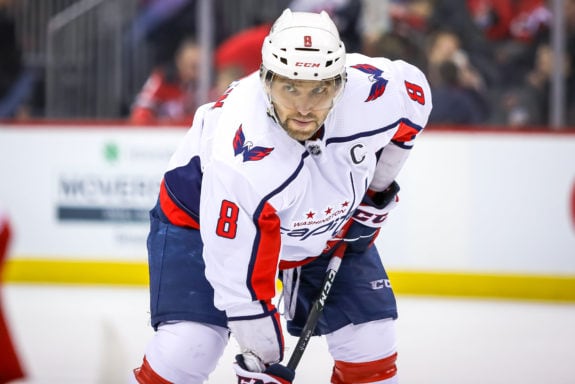
Washington’s most important offseason move was re-signing legendary goal scorer Alex Ovechkin, their 36-year-old captain. The contract is a five-year, $47.5 million deal that will last the future Hall of Famer through his age-40 season (2025-26) and will allow him to continue pursuing Wayne Gretzky’s all-time goals record of 894. Ovechkin currently sits at 730.
The team also lost a legend this offseason when defenseman Zdeno Chara signed with the New York Islanders and another d-man after that when they dealt Brendan Dillon to the Winnipeg Jets. For a team with a middling defense last season and no significant succession plans for Chara or Dillon (nor any upgrade in goal), keeping the puck out of the net could become a problem in Washington. Still, the Caps will likely be regular season warriors once again behind their usual powerhouse offense, but the Devils have surely gained some ground on them because of their strong offseason. Is it enough ground gained to significantly improve from their 0-8 season series versus Washington last season? We’ll just have to wait and see.
New York Islanders (32-17-7)
Rounding out the four playoff favorites in the Metro, the Islanders saw an impressive 2020-21 playoff run end at the hands of the Tampa Bay Lightning in game seven of the Eastern Conference Final. A strong team predicated on their shutdown defense (second-best in goals against last season, sixth-best penalty kill), New York will look to continue their success under head coach Barry Trotz as they move to the brand new UBS Arena in Belmont.
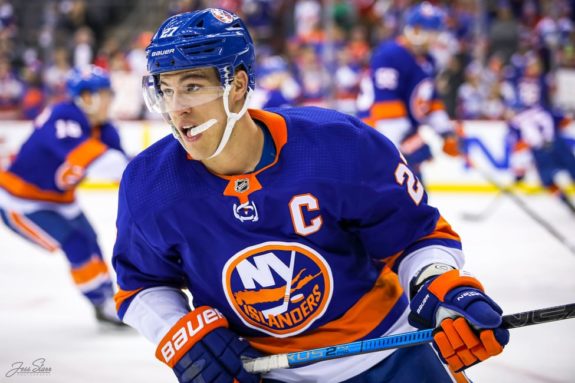
While the Isles made some significant moves during the offseason, their greatest “addition” is likely to be the return of captain Anders Lee, who missed the end of 2020-21 due to a serious knee injury. General manager Lou Lamoriello did his best to keep the band together by re-signing former Devil Kyle Palmieri, Adam Pelech, Casey Cizikas, and Anthony Beauvillier. However, the expansion draft saw forward Jordan Eberle pack his bags for Seattle. Some new (sort of) faces include former Devil captain Zach Parise and the aforementioned Chara.
New York is a team that managed to hold its own in the postseason without arguably their best player in Lee; a sign that this team is absolutely for real and with good health should once again be among the better squads in the NHL. They have a serious shot at becoming the class of the Metropolitan this season, and while doing so, could once again gain some affection from Devils fans considering their collection of former favorites Palmieri, Parise, and Andy Greene.
Related: New Jersey Devils 2021-22 Season Preview
New York Rangers (27-23-6)
Like the Devils, the Rangers are looking for improved results after a quick rebuilding process that has netted them some of the league’s most exciting young players. While immediate results may not be there, the parallels between the two teams look poised to set up consistent battles for the top of the division in the years to come.
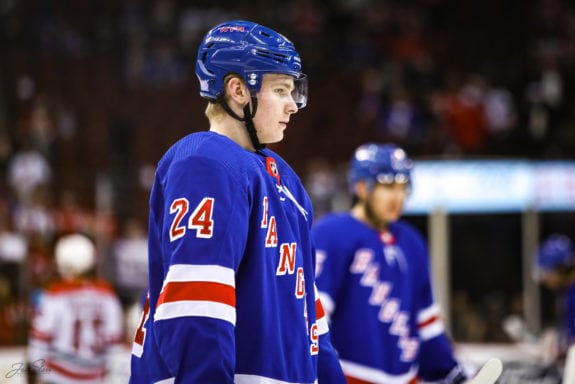
The Rangers possess two of hockey’s most highly touted young stars in Kaapo Kakko and Alexis Lafreniere, much like how New Jersey has two former number one overall selections in Nico Hischier and Jack Hughes. The two clubs also have immensely important building blocks on the back end that share similar traits; Adam Fox has arrived as one of the league’s best d-men, and K’Andre Miller is an up-and-coming offensive star. Those guys may remind Devils fans of Dougie Hamilton and Ty Smith, respectively. The rivals also have two mid-twenties netminders in Igor Shesterkin and Mackenzie Blackwood, who are both trying to prove they can deliver as franchise options.
However, the Rangers (for the moment) have the advantage because of players like Mika Zibanejad, Artemi Panarin, and Chris Kreider — a great group of team-driving veterans that the Devils lack. The key to an improved season from New York will be their youth, though. Should their youngsters make a significant leap in their development, the Blueshirts will become a tough matchup for anyone, most of all the Devs.
Philadelphia Flyers (25-23-8)
Much has been made about Philadelphia’s defensive ineptitude last season, and the front office got the message. After giving up more goals than anybody in the NHL, the Flyers aggressively addressed the position during the offseason in an attempt to give goalie Carter Hart some help.

The biggest acquisition for Philly was defenseman Ryan Ellis, who came over from the Nashville Predators after ten years of work. Notably, the team parted with Nolan Patrick in the deal, who was once at the center of draft speculation when the Devils were said to be choosing between him and Hischier in 2017. The Flyers also went ahead and (questionably) traded for Sabres defender Rasmus Ristolainen and subsequently signed well-traveled blueliner Keith Yandle to a one-year deal. If anything, the on-ice product will look a lot different, but the moves made should noticeably improve the team defensively.
Will that result in a playoff berth for them, though? Maybe not. The Flyers still have some work to do to improve their game (15th in goals for and 18th in power play percentage) while they try to regain some of Hart’s confidence after a brutal season. Still, this is a squad that got better from last season and is only two years removed from finishing second in the division. The ability of Claude Giroux, Sean Couturier, James van Riemsdyk, and Travis Konecny is nothing to laugh at.
Columbus Blue Jackets (18-26-12)
The Blue Jackets made a lot of moves this offseason that’ll see them finish towards the bottom of the division yet again. That’s not to say those moves were bad, though. Columbus wisely maneuvered the NHL Entry Draft, which bolstered their farm system in ways that should pay off down the road.
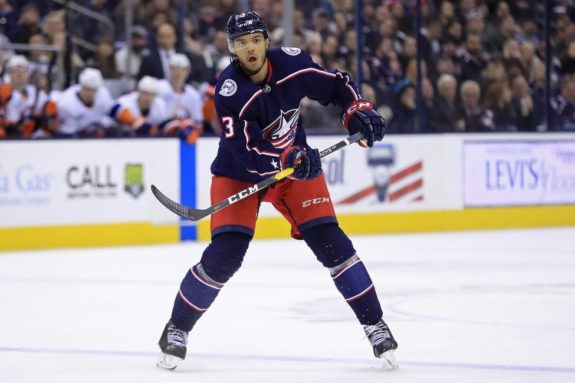
The trade of Seth Jones to the Chicago Blackhawks not only brought 21-year-old (and former 8th overall pick) defenseman Adam Boqvist to Columbus, but it paved the way for the Jackets to trade for another young, promising blueliner in Jake Bean. The team then also had to opportunity to make three top-25 selections in the first round of the draft, acquiring impressive prospects Kent Johnson, Cole Sillinger, and Corson Ceulemans.
Like the Devils of the last few seasons, Columbus will likely struggle to remain competitive as they wait for their farm system to develop. As perhaps the only sub-par team in the division, how Jersey handles the Jackets this season could be indicative of just how far they’ve come.
A Devil Playoff Berth Would Take a Lot
Clearly, the level of competition in the Metropolitan Division is deep. There will be few divisional games that’ll be cakewalks for New Jersey and plenty where the Devs will simply be overmatched. A strong start to the season is essential if they want to achieve their goal of playing meaningful games down the stretch.
In all likelihood, Jersey’s best shot at returning to the postseason is via one of the wild card slots. But it’ll take a big step up from everyone on the roster — not just the stars or the new additions. Everyone would need to show marked improvement on this Devil team to go from one of the worst teams in the league to playoff contenders. Even then, the scrap to secure a spot may be in vain.
